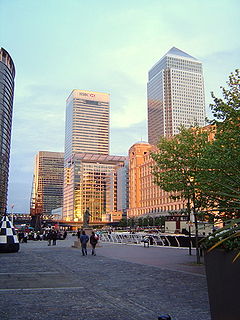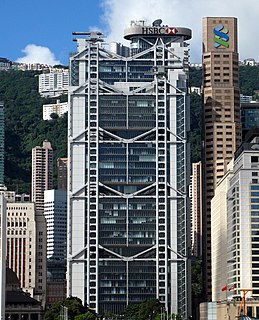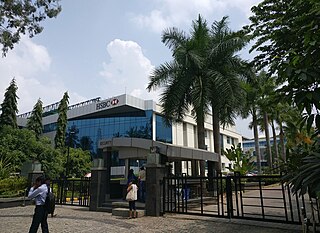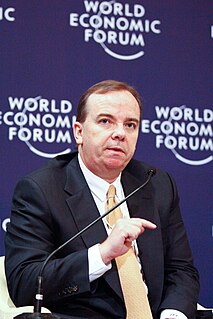
Business is the activity of making one's living or making money by producing or buying and selling products. Simply put, it is "any activity or enterprise entered into for profit."

A multinational company (MNC) is a corporate organization that owns or controls the production of goods or services in at least one country other than its home country. Black's Law Dictionary suggests that a company or group should be considered a multinational corporation if it derives 25% or more of its revenue from out-of-home-country operations. A multinational corporation can also be referred to as a multinational enterprise (MNE), a transnational enterprise (TNE), a transnational corporation (TNC), an international corporation, or a stateless corporation. There are subtle but real differences between these terms.
A mutual fund is an open-end professionally managed investment fund that pools money from many investors to purchase securities. Mutual funds are "the largest proportion of equity of U.S. corporations." Mutual fund investors may be retail or institutional in nature. The term is typically used in the United States, Canada, and India, while similar structures across the globe include the SICAV in Europe and open-ended investment company (OEIC) in the UK.

HSBC Holdings plc is a British multinational investment bank and financial services holding company. It is the second largest bank in Europe, with total assets of US$2.984 trillion. HSBC traces its origin to a hong in British Hong Kong, and its present form was established in London by the Hongkong and Shanghai Banking Corporation to act as a new group holding company in 1991; its name derives from that company's initials. The Hongkong and Shanghai Banking Corporation opened branches in Shanghai in 1865 and was first formally incorporated in 1866.
An offshore bank is a bank regulated under international banking license, which usually prohibits the bank from establishing any business activities in the jurisdiction of establishment. Due to less regulation and transparency, accounts with offshore banks were often used to hide undeclared income. Since the 1980s, jurisdictions that provide financial services to nonresidents on a big scale, can be referred to as offshore financial centres. OFCs often also levy little or no corporation tax and/or personal income and high direct taxes such as duty, making the cost of living high.

National Stock Exchange of India Limited (NSE) is the leading stock exchange of India, located in the Mumbai (Bombay) city of Maharashtra state. It is under the ownership of some leading financial institutions, Banks, and Insurance companies. NSE was established in 1992 as the first dematerialized electronic exchange in the country. NSE was the first exchange in the country to provide a modern, fully automated screen-based electronic trading system that offered easy trading facilities to investors spread across the length and breadth of the country. Vikram Limaye is Managing Director & Chief Executive Officer of NSE.
Double taxation is the levying of tax by two or more jurisdictions on the same income, asset, or financial transaction.

HSBC, officially known as The Hongkong and Shanghai Banking Corporation Limited, is a wholly owned subsidiary of HSBC, the largest bank in Hong Kong, and operates branches and offices throughout the Indo-Pacific region, and in other countries around the world. It is also one of the three commercial banks licensed by the Hong Kong Monetary Authority to issue banknotes for the Hong Kong dollar.

Permanent residency is a person's legal resident status in a country or territory of which such person is not a citizen but where they have the right to reside on a permanent basis. This is usually for a permanent period; a person with such legal status is known as a permanent resident. In the United States, such a person is referred to as a green card holder but more formally as a Lawful Permanent Resident (LPR).
Prime brokerage is the generic name for a bundled package of services offered by investment banks, wealth management firms, and securities dealers to hedge funds which need the ability to borrow securities and cash in order to be able to invest on a netted basis and achieve an absolute return. The prime broker provides a centralized securities clearing facility for the hedge fund so the hedge fund's collateral requirements are netted across all deals handled by the prime broker. These two features are advantageous to their clients.
Domicile is relevant to an individual's "personal law," which includes the law that governs a person's status and their property. It is independent of a person's nationality. Although a domicile may change from time to time, a person has only one domicile, or residence, at any point in their life, no matter what their circumstances. Domicile is distinct from habitual residence, where there is less focus on future intent.

An offshore fund is generally a collective investment scheme domiciled in an offshore jurisdiction. Like the term "offshore company", the term is more descriptive than definitive, and both the words 'offshore' and 'fund' may be construed differently.

HSBC Bank plc is a British multinational banking and financial services organisation. HSBC's international network comprises around 7,500 offices in over 80 countries and territories in Europe, the Asia-Pacific region, the Americas, the Middle East and Africa.
Offshore investment is the keeping of money in a jurisdiction other than one's country of residence. Offshore jurisdictions are used to pay less tax in many countries by large and small-scale investors. Poorly regulated offshore domiciles have served historically as havens for tax evasion, money laundering, or to conceal or protect illegally acquired money from law enforcement in the investor's country. However, the modern, well-regulated offshore centres allow legitimate investors to take advantage of higher rates of return or lower rates of tax on that return offered by operating via such domiciles. The advantage to offshore investment is that such operations are both legal and less costly than those offered in the investor's country—or "onshore".
Michael Francis Geoghegan CBE is an international banking business executive, who served as the chief executive (CEO) of HSBC from 26 March 2006 to 31 December 2010. He joined HSBC in 1973 and had previously led the group's South American and European operations.
The criteria for residence for tax purposes vary considerably from jurisdiction to jurisdiction, and "residence" can be different for other, non-tax purposes. For individuals, physical presence in a jurisdiction is the main test. Some jurisdictions also determine residency of an individual by reference to a variety of other factors, such as the ownership of a home or availability of accommodation, family, and financial interests. For companies, some jurisdictions determine the residence of a corporation based on its place of incorporation. Other jurisdictions determine the residence of a corporation by reference to its place of management. Some jurisdictions use both a place-of-incorporation test and a place-of-management test.

HSBC Bank India, an Indian subsidiary of UK-based HSBC Holdings plc, is a bank with its operational head office in Mumbai. It is a foreign bank under the Banking Regulation Act, 1949 and thus is regulated by the Reserve Bank of India (RBI).

Stuart Thomson Gulliver is a British banker, and the former group chief executive of HSBC. He was succeeded on 21 February 2018 by John Flint.

An investment fund is a way of investing money alongside other investors in order to benefit from the inherent advantages of working as part of a group such as reducing the risks of the investment by a significant percentage. These advantages include an ability to:
Since the late-2000s, the People's Republic of China (PRC) has sought to internationalize its official currency, the Renminbi (RMB). RMB internationalization accelerated in 2009 when China established the dim sum bond market and expanded Cross-Border Trade RMB Settlement Pilot Project, which helps establish pools of offshore RMB liquidity. The RMB was the 8th-most-traded currency in the world in 2013 and the 7th-most-traded in early 2014. By the end of 2014, RMB ranked 5th as the most traded currency, according to SWIFT's report, at 2.2% of SWIFT payment behind JPY (2.7%), GBP (7.9%), EUR (28.3%) and USD (44.6%). In February 2015, RMB became the second most used currency for trade and services, and reached the ninth position in forex trading. The RMB Qualified Foreign Institutional Investor (RQFII) quotas were also extended to five other countries — the UK, Singapore, France, Korea, Germany, and Canada, each with the quotas of ¥80 billion except Canada and Singapore (¥50bn). Previously, only Hong Kong was allowed, with a ¥270 billion quota.










